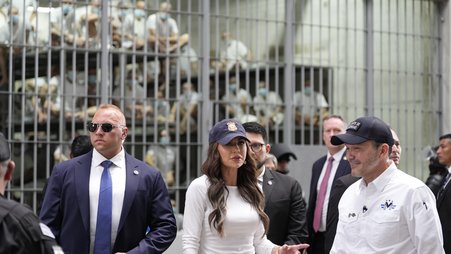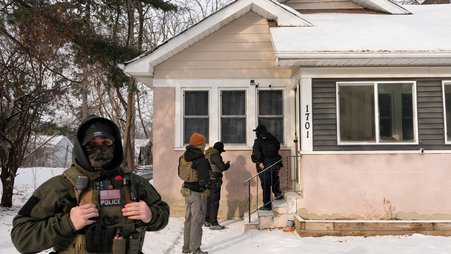There seems to be a new talking point from government officials since a federal judge ruled NSA surveillance is likely unconstitutional last week: if Edward Snowden thinks he's a whistleblower, he should come back and stand trial.
National Security Advisor Susan Rice said on 60 Minutes Sunday, “We believe he should come back, he should be sent back, and he should have his day in court.” Former CIA deputy director Mike Morell made similar statements this weekend, as did Rep. Mike Rogers (while also making outright false claims about Snowden at the same time). Even NSA reform advocate Sen. Mark Udall said, "He ought to stand on his own two feet. He ought to make his case. Come home, make the case that somehow there was a higher purpose here.”
These statements belie a fundamental misunderstanding about how Espionage Act prosecutions work.
If Edward Snowden comes back to the US to face trial, he likely will not be able to tell a jury why he did what he did, and what happened because of his actions. Contrary to common sense, there is no public interest exception to the Espionage Act. Prosecutors in recent cases have convinced courts that the intent of the leaker, the value of leaks to the public, and the lack of harm caused by the leaks are irrelevant—and are therefore inadmissible in court.
This is why rarely, if ever, whistleblowers go to trial when they’re charged under the Espionage Act, and why the law—a relic from World War I—is so pernicious. John Kiriakou, the former CIA officer who was the first to go on-the-record with the media about waterboarding, pled guilty in his Espionage Act case last year partially because a judge ruled he couldn’t tell the jury about his lack of intent to harm the United States.
In the ongoing leak trial of former State Department official Stephen Kim, the judge recently ruled that the prosecution “need not show that the information he allegedly leaked could damage U.S. national security or benefit a foreign power, even potentially.” (emphasis added)
In the Espionage Act case against NSA whistleblower Thomas Drake (which later fell apart), the government filed two separate motions to make sure the words "whistleblowing" or "overclassification" would never be uttered at trial.
The same scenario just played out in the Chelsea Manning trial this summer. Manning's defense wanted to argue she intended to inform the public, that the military was afflicted with a deep and unnecessary addiction to overclassification, and that the government’s own internal assessments showed she caused no real damage to U.S. interests. All this information was ruled inadmissible until sentencing. Manning was sentenced to thirty-five years in jail—longer than most actual spies under the Espionage Act.
If the same holds true in Snowden’s case, the administration will be able to exclude almost all knowledge beneficial to his case from a jury until he’s already been found guilty of felonies that will have him facing decades, if not life, in jail.
This would mean Snowden could not be able to tell the jury that his intent was to inform the American public about the government’s secret interpretations of laws used to justify spying on millions of citizens without their knowledge, as opposed to selling secrets to hostile countries for their advantage.
If the prosecution had their way, Snowden would also not be able to explain to a jury that his leaks sparked more than two dozen bills in Congress, and half a dozen lawsuits, all designed to rein in unconstitutional surveillance. He wouldn’t be allowed to explain how his leaks caught an official lying to Congress, that they’ve led to a White House review panel recommending forty-six reforms for US intelligence agencies, or that they've led to an unprecedented review of government secrecy. He wouldn't be able to talk about the sea change in the public's perception of privacy since his leaks, or the fact that a majority of the public considers him a whistleblower.
He might not even be able to bring up the fact that a US judge ruled that surveillance he exposed was ruled to likely be unconstitutional.
The jury would also not be able to hear how there’s been no demonstrable harm to the United States since much of this information has been published. And if the prosecution was able to prove there was some harm to the US, Snowden wouldn’t be able to explain that the enormous public benefits of these disclosures far outweighed any perceived harm.
Every American should be outraged that leakers and whistleblowers are being prosecuted under an espionage statute without ever having to show they meant to harm the U.S. or that any harm actually occurred. Given there are two dozen bills calling for the reform of the NSA in the wake of Snowden's revelations, there should also be reform of the Espionage Act, so it cannot be used by the government as a sword to protect itself from accountability.




